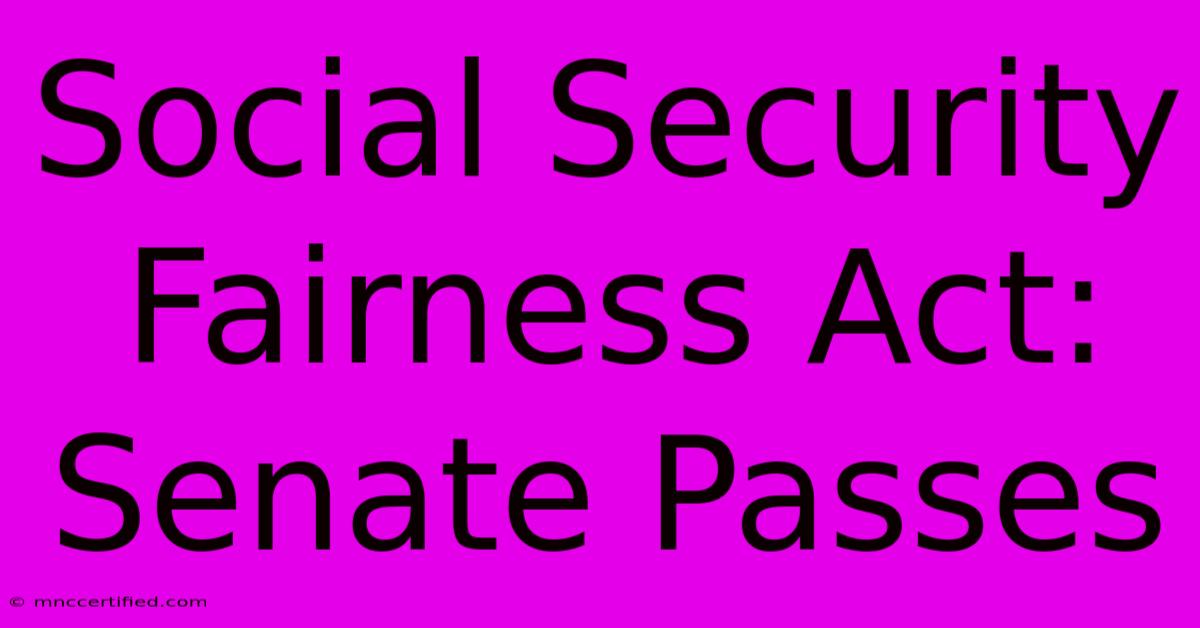Social Security Fairness Act: Senate Passes

Table of Contents
Social Security Fairness Act: Senate Passes — What it Means for Federal Workers
The Senate's recent passage of the Social Security Fairness Act marks a significant victory for federal employees and retirees. This bipartisan bill aims to rectify a long-standing inequity in how Social Security benefits are calculated for those who dedicate their careers to public service. Let's delve into the details of this landmark legislation and explore its implications.
Understanding the Injustice: The Windfall Elimination Provision (WEP) and the Government Pension Offset (GPO)
For years, federal employees and other public servants have faced unfair reductions in their Social Security benefits due to two provisions: the Windfall Elimination Provision (WEP) and the Government Pension Offset (GPO). These provisions were designed to prevent individuals from receiving "double-dipping" benefits, but their impact has been disproportionately harsh on many who rely on Social Security for a substantial portion of their retirement income.
The Windfall Elimination Provision (WEP)
The WEP reduces Social Security benefits for individuals who receive a pension from a government job based on a formula that often drastically lowers their benefits. This impacts individuals who worked in jobs with limited Social Security coverage, or those who worked part time for years alongside their public service. The reduction can be significant, particularly for those who contributed to Social Security for a shorter period. This has led to considerable financial hardship for many retirees.
The Government Pension Offset (GPO)
The GPO affects surviving spouses of federal employees. It reduces their survivor benefits by two-thirds of the amount of their deceased spouse's government pension. This can severely impact the financial security of widows and widowers who relied on their spouse's income and Social Security benefits for support.
The Social Security Fairness Act: A Path to Equitable Benefits
The Social Security Fairness Act seeks to eliminate or significantly mitigate the negative effects of both the WEP and the GPO. The bill doesn't eliminate the underlying principles behind these provisions entirely, instead opting for a more nuanced and equitable approach. It aims to ensure that those who devoted their careers to public service receive a fair and just Social Security retirement they've earned.
Key Provisions of the Act
- Repeal or Reform of WEP: The act proposes either a complete repeal of the WEP or a significant modification to its calculation formula, resulting in less severe benefit reductions for affected individuals.
- Repeal or Reform of GPO: Similarly, the act addresses the GPO, either repealing it or substantially reforming its structure to ensure that surviving spouses receive fairer survivor benefits.
- Retroactive Application: A crucial aspect of the proposed legislation is its potential for retroactive application. This means that those who have already been negatively impacted by the WEP and GPO could receive recalculated benefits, potentially receiving back payments for past injustices.
The Road Ahead: What Happens Next?
While the Senate's passage of the Social Security Fairness Act is a major step forward, it still needs to pass the House of Representatives before becoming law. Even after House passage, the President's signature is necessary. While there's bipartisan support, the timeline for final passage remains uncertain.
Impact and Implications for Federal Workers
The successful enactment of the Social Security Fairness Act would have a profound and positive impact on millions of federal workers and retirees. It would:
- Provide Financial Relief: Retirees and surviving spouses would see an increase in their Social Security benefits, improving their financial security.
- Restore Fairness: The act would rectify a longstanding inequity in the Social Security system, ensuring that federal employees receive fair treatment compared to their private sector counterparts.
- Boost Retirement Security: Increased Social Security benefits contribute significantly to a more secure and comfortable retirement for public servants.
This legislation represents a crucial step towards ensuring a more equitable and just retirement system for all Americans, particularly those who have dedicated their careers to public service. We will continue to monitor the progress of this important bill and provide updates as they become available. Keep an eye on this space for the latest developments regarding the Social Security Fairness Act.
Keywords: Social Security Fairness Act, Senate, passes, WEP, Windfall Elimination Provision, GPO, Government Pension Offset, federal employees, retirees, Social Security benefits, retirement, pension, bipartisan, Congress, House of Representatives, retroactive, legislation, financial security, retirement security, public service.

Thank you for visiting our website wich cover about Social Security Fairness Act: Senate Passes. We hope the information provided has been useful to you. Feel free to contact us if you have any questions or need further assistance. See you next time and dont miss to bookmark.
Featured Posts
-
Hollywood Brown Plays Chiefs Saturday
Dec 22, 2024
-
West Ham Vs Brighton Kick Off Tv Prediction
Dec 22, 2024
-
Mitchell Scores 27 Cavs 15 1 At Home
Dec 22, 2024
-
Rank Strangers To Me Bob Dylan Album Review
Dec 22, 2024
-
Teen Tennis Sensations Aussie Victory
Dec 22, 2024